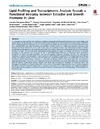Identificador persistente para citar o vincular este elemento:
https://accedacris.ulpgc.es/jspui/handle/10553/21076
| Título: | Lipid profiling and transcriptomic analysis reveals a functional interplay between estradiol and growth hormone in liver | Autores/as: | Fernández Pérez, Leandro Santana Farré, Ruymán De Mirecki Garrido, Mercedes García, Irma Guerra, Borja Mateos-Díaz, Carlos Iglesias-Gato, Diego Díaz Chico, Juan Carlos Flores Morales, Amílcar Díaz, Mario |
Clasificación UNESCO: | 320502 Endocrinología | Palabras clave: | Lipid Growth hormone Estradiol Liver |
Fecha de publicación: | 2014 | Proyectos: | Estudio Funcional y Molecular de Las Proteínas Socs en Un Modelo de Resistencia Hepática A Insulina. | Publicación seriada: | PLoS ONE | Resumen: | 17b-estradiol (E2) may interfere with endocrine, metabolic, and gender-differentiated functions in liver in both females and males. Indirect mechanisms play a crucial role because of the E2 influence on the pituitary GH secretion and the GHR-JAK2- STAT5 signaling pathway in the target tissues. E2, through its interaction with the estrogen receptor, exerts direct effects on liver. Hypothyroidism also affects endocrine and metabolic functions of the liver, rendering a metabolic phenotype with features that mimic deficiencies in E2 or GH. In this work, we combined the lipid and transcriptomic analysis to obtain comprehensive information on the molecular mechanisms of E2 effects, alone and in combination with GH, to regulate liver functions in males. We used the adult hypothyroid-orchidectomized rat model to minimize the influence of internal hormones on E2 treatment and to explore its role in male-differentiated functions. E2 influenced genes involved in metabolism of lipids and endo-xenobiotics, and the GH-regulated endocrine, metabolic, immune, and male-specific responses. E2 induced a female-pattern of gene expression and inhibited GH-regulated STAT5b targeted genes. E2 did not prevent the inhibitory effects of GH on urea and amino acid metabolism-related genes. The combination of E2 and GH decreased transcriptional immune responses. E2 decreased the hepatic content of saturated fatty acids and induced a transcriptional program that seems to be mediated by the activation of PPARa. In contrast, GH inhibited fatty acid oxidation. Both E2 and GH replacements reduced hepatic CHO levels and increased the formation of cholesterol esters and triacylglycerols. Notably, the hepatic lipid profiles were endowed with singular fingerprints that may be used to segregate the effects of different hormonal replacements. In summary, we provide in vivo evidence that E2 has a significant impact on lipid content and transcriptome in male liver and that E2 exerts a marked influence on GH physiology, with implications in human therapy. | URI: | https://accedacris.ulpgc.es/handle/10553/21076 | ISSN: | 1932-6203 | DOI: | 10.1371/journal.pone.0096305 | Fuente: | PLoS ONE [EISSN 1932-6203], v. 9 (5), e96305, (Mayo 2014) | Derechos: | by-nc-nd |
| Colección: | Artículos |
Citas SCOPUSTM
14
actualizado el 08-jun-2025
Citas de WEB OF SCIENCETM
Citations
14
actualizado el 15-feb-2026
Visitas
109
actualizado el 10-ago-2024
Descargas
217
actualizado el 10-ago-2024
Google ScholarTM
Verifica
Altmetric
Comparte
Exporta metadatos
Los elementos en ULPGC accedaCRIS están protegidos por derechos de autor con todos los derechos reservados, a menos que se indique lo contrario.
